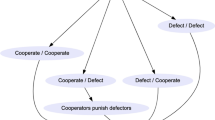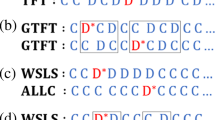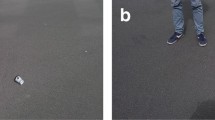Abstract
It is known that altruism can be sustained in an evolving population by a process of group selection. There is also existing research on the role that punishment can play in inducing selfish agents to behave more co-operatively or in preventing selfish agents from evolving, and the limitations upon this mechanism. This paper embeds a simple model of a punishment system within an indirect cultural evolution framework. The use of punishment is shown to reduce the potency of the group selection mechanism, and thus the level of evolved altruism. This presents a novel reason why the use of punishment may have negative dynamic welfare implications.



Similar content being viewed by others
Notes
Antisocial punishment involves sanctions such as altruistic punishment being directed against co-operators instead of non-co-operators. (On one explanatory hypothesis, it may be carried out by non-co-operators retaliating against observed previous punishment which they believe to have been carried out by co-operators.) The prevalence of this phenomenon is socially dependent and negatively correlated to the depth of the rule of law and civic society.
In this study, entire groups play a public goods game where each individual starts with an amount of money to split between an individual and a group account. The group account is then doubled and split between the group members. Each individual then observes the contributions to the group account made by others, and can impose a punishment which harms both the punisher and the punishee, at a cost ratio of 1:3. Finally, group competition is introduced via a mechanism whereby a bonus or penalty is applied to each group based upon the relative size of the group account after contributions have been made.
This is assuming, for simplicity, no discounting. Permitting discounting would be problematic because we would then have to decide whether or not to discount felicity payoffs as well as social utility payoffs. It would also not really add anything insightful to the analysis of a finite-move sequential game.
A high altruism individual refraining from punishing and imposing the cost of 1 on the other individual at benefit \(\hat {\pi }\) to herself is equivalent to bestowing a benefit of 1 upon the other at a cost of \(\hat {\pi }\) to herself. The simultaneous-move punishment game therefore has almost the same payoffs as the prisoners’ dilemma, except that person 2, if she has phenotype L, punishes person 3 instead of person 1.
\({U_{i}^{H}}\) and \({U_{i}^{L}}\) are the expected felicity payoffs in group i. Note also the introduction of a fixed payoff f. This is the same for both phenotypes and thus has no effect on relative fitness, but is needed to ensure that both types always gain a strictly positive payoff.
References
Becker GS (1976) Altruism, egoism, and genetic fitness: economics and sociobiology. J Econ Lit 14(3):817–826
Bergstrom TC (2002) Evolution of social behavior: individual and group selection. J Econ Perspect 16(2):67–88
Blackmore SJ (1999) The meme machine. Oxford University Press, Oxford
Bowles S (2006) Group competition, reproductive leveling, and the evolution of human altruism. Science 314(5805):1569–1572
Bowles S (2009) Did warfare among ancestral hunter-gatherers affect the evolution of human social behaviors? Science 324(5932):1293–1298
Boyd R, Richerson PJ (1982) Cultural transmission and the evolution of cooperative behavior. Hum Ecol 10(3):325–351
Boyd R, Gintis H, Bowles S, Richerson PJ (2003) The evolution of altruistic punishment. Proce Natl Acad Sci 100(6)
Cooper B, Wallace C (2004) Group selection and the evolution of altruism. Oxf Econ Pap 56:307–330
Darwin C (1872) On the origin of species by means of natural selection: or the preservation of favored races in the struggle for life, 5th edn. D. Appleton, New York
Denant-Boemont L, Masclet D, Noussair CN (2007) Punishment, counterpunishment and sanction enforcement in a social dilemma experiment. Econ Theory 33(1):145–167
Egas M, Riedl A (2008) The economics of altruistic punishment and the maintenance of cooperation. Proc Royal Soc B: Biol Sci 275(1637):871–878
Fehr E, Fischbacher U (2003) The nature of human altruism. Nature 425:785–791
Fehr E, Gächter S (2000a) Cooperation and punishment in public goods experiments. Am Econ Rev 90(4):980–994
Fehr E, Gächter S (2000b) Fairness and retaliation: the economics of reciprocity. J Econ Perspect 14(3):159–181
Fehr E, Gächter S (2002a) Altruistic punishment in humans. Nature 415:137–140
Fehr E, Gächter S (2002b) Strong reciprocity, human cooperation and the enforcement of social norms. Hum Nat 13:1–25
Güth W, Yaari M (1992) An evolutionary approach to explain reciprocal behavior in a simple strategic game. In: Witt U (ed) Explaining Process and change: approaches to evolutionary economics. University of Michigan Press, pp 23–34
Hamilton WD (1963) The evolution of altruistic behavior. Am Nat 97(896):354–356
Hamilton WD (1972) Altruism and related phenomena, mainly in social insects. Ann Rev Ecol Syst 3(1):193–232
Hayek FA (1988) The fatal conceit: the errors of socialism. Routledge
Herrmann B, Thöni C, Gächter S (2008) Antisocial punishment across societies. Science 319(5868):1362–1367
Hirshleifer J (1977) Economics from a biological viewpoint. J Law Econ 20(1):1
Huck S, Oechssler J (1999) The indirect evolutionary approach to explaining fair allocations. Games Econ Behav 28(1):13–24
Nikiforakis N (2008) Punishment and counter-punishment in public good games: can we really govern ourselves? J Publ Econ 92(1):91–112
Nikiforakis N, Normann HT (2008) A comparative statics analysis of punishment in public-good experiments. Exp Econ 11(4):358–369
Price GR (1970) Selection and covariance. Nature 227:520–521
Rand DG, Armao IV JJ, Nakamaru M, Ohtsuki H (2010) Anti-social punishment can prevent the co-evolution of punishment and cooperation. J Theor Biol 265(4):624–632
Sääksvuori L, Mappes T, Puurtinen M (2011) Costly punishment prevails in intergroup conflict. Proc R Soc B: Biol Sci 278(1723):3428–3436
Smith A (1976) An inquiry into the nature and causes of the wealth of nations. Oxford University Press, Oxford
Sober E, Wilson DS (1994) Reintroducing group selection to the human behavioral sciences. Behav Brain Sci 17(4):585–654
Sober E, Wilson DS (1999) Unto others. Harvard University Press, Cambridge
Soltis J, Boyd R, Richerson P (1995) Can group-functional behaviors evolve by cultural group selection?: an empirical test. Curr Anthropol 36(3):473–494
Acknowledgements
I would like to express my gratitude to the United Kingdom Economic and Social Research Council and to the Royal Economic Society for funding this research. I would also like to thank Kevin Roberts, Chris Wallace, Peter Hammond and the referee for their useful comments, suggestions and feedback on various drafts of this paper. The usual disclaimers apply.
Author information
Authors and Affiliations
Corresponding author
Rights and permissions
About this article
Cite this article
Povey, R. Punishment and the potency of group selection. J Evol Econ 24, 799–816 (2014). https://doi.org/10.1007/s00191-014-0375-3
Published:
Issue Date:
DOI: https://doi.org/10.1007/s00191-014-0375-3
Keywords
- Altruism
- Punishment
- Social preferences
- Group selection
- Multilevel selection
- Indirect evolution
- Cultural evolution




